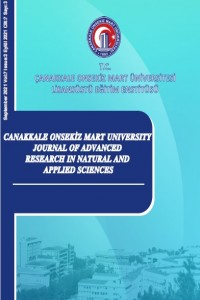Abstract
Thanks
Yazar katkılarından dolayı Prof. Dr. Turgut T. Onay'a teşekkürlerini sunar.
References
- ACSGOHY, (2013). Regulations on Health and Safety Measures Intended for Workers Working with Asbestos, Official Journal number 28539 on 25.01.2013, Ankara. Retrieved from: https://www.mevzuat.gov.tr/mevzuat?MevzuatNo=17050&MevzuatTur=7&MevzuatTertip=5
- APTSR, (2005). Asbest veya Asbestli Malzeme ile Üretım Yapılan İşyerlerinde İş Sağlığı ve Güvenliği Proje Denetimi Sonuç Raporu, T.C. Çalışma ve Sosyal Güvenlik Bakanlığı İş Teftiş Kurulu Başkanlığı, Ankara. Retrieved from: https://ailevecalisma.gov.tr/medias/5974/2005_01.pdf
- ASTM, (2002). “Standard Test Method for Microvacuum Sampling and Indirect Analysis of Dust by Transmission Electron Microscopy for Asbestos Mass Concentration”, ASTM D5756, American Society for Testing and Materials, Conshohocken, PA.
- Cossette, M., and P. Delvaux (1979). “Technical Evaluation of Chrysotile Asbestos Ore Bodies”, Short Course in Mineralogical Techniques of Asbestos Determination, R. L. Ledoux, ed., Mineralogical Association of Canada, pp. 79–110.
- Deer, W. A., R. A. Howie, and J. Zussman (2009). Serpentines, Rock-forming minerals: Layered silicates excluding micas and clay minerals, Vol. 3B, John Wiley & Sons, New York, pp. 157–211. Retrieved from: https://pubs.geoscienceworld.org/canmin/article-abstract/48/5/1319/127220
- ISO 13794, (1999). Ambient Air—Determination of Asbestos Fibres — Indirect-Transfer Transmission Electron Microscopy Method, International Organization for Standardization, Geneva, Switzerland.
- ISO 14966, (2002). Ambient Air—Determination of Numerical Concentration of Inorganic Fibrous Particles—Scanning Electron Microscopy Method, International Organization for Standardization, Geneva, Switzerland.
- Rees., D., Phillips, J.I., Garton, E. ve Pooley, F.D. (2001). Asbestos lung fibre concentrations in south African chrysotile mine workers. Ann. Occup. Hyg.,45/6, 473-477, Retrieved from: https://www.sciencedirect.com/science/article/pii/S0003487800000880
- ZMKKYHY, (2014). Regulation on Restriction and Prohibition of Hazardous Substances and Mixtures, Official Journal number 27277 on 03.07.2009, Ankara. Retrieved from: https://www.resmigazete.gov.tr/eskiler/2014/11/20141121-6.htm
Characterization of Asbestos in Ambient Air During Refractory Material Production from Magnesite Ore
Abstract
Asbestos is a general term employed for crystallized silicate minerals in fibril form. It can be commonly found in nature and from which fibre uses in the industry through processing are obtained. It is dielectric and fibrous, having an elastic feature. However, there is limited information about the air quality in terms of asbestos for the companies that produce refractory materials from magnesite ore. This deficiency in the literature can be eliminated with this study for a company with high quality and durable refractory materials. Among the most commonly used asbestos analysis are scanning electron microscope (SEM), transmission electron microscope (TEM). Asbestos analyses have been performed in two different institutions on the parallel samples whose preliminary processes have been completed. According to the results of the examinations conducted by SEM, 23 of the fibrils observed in a total area are bigger than five µmin lengths and less than 3 µm in width. Three of these fibrils were observed to have the characteristics of chrysotile fibres morphemically and elementally. In addition, airborne samples were analyzed using a TEM instrument. According to the results obtained, 13 of the fibrils observed in total were bigger than 5 µm in length and less than 3 µm in width and based on ED analysis and elemental composition (EDXA) results of these fibrils, and they were not observed to have the characteristics of chrysotile fibres. The majority of the fibrils observed were noted to be other inorganic minerals (lizardite) fibrils. Additionally, the obtained results show that the asbestos concentration in the air is below the limit specified by the provision (0,1 fiber/cm3).
References
- ACSGOHY, (2013). Regulations on Health and Safety Measures Intended for Workers Working with Asbestos, Official Journal number 28539 on 25.01.2013, Ankara. Retrieved from: https://www.mevzuat.gov.tr/mevzuat?MevzuatNo=17050&MevzuatTur=7&MevzuatTertip=5
- APTSR, (2005). Asbest veya Asbestli Malzeme ile Üretım Yapılan İşyerlerinde İş Sağlığı ve Güvenliği Proje Denetimi Sonuç Raporu, T.C. Çalışma ve Sosyal Güvenlik Bakanlığı İş Teftiş Kurulu Başkanlığı, Ankara. Retrieved from: https://ailevecalisma.gov.tr/medias/5974/2005_01.pdf
- ASTM, (2002). “Standard Test Method for Microvacuum Sampling and Indirect Analysis of Dust by Transmission Electron Microscopy for Asbestos Mass Concentration”, ASTM D5756, American Society for Testing and Materials, Conshohocken, PA.
- Cossette, M., and P. Delvaux (1979). “Technical Evaluation of Chrysotile Asbestos Ore Bodies”, Short Course in Mineralogical Techniques of Asbestos Determination, R. L. Ledoux, ed., Mineralogical Association of Canada, pp. 79–110.
- Deer, W. A., R. A. Howie, and J. Zussman (2009). Serpentines, Rock-forming minerals: Layered silicates excluding micas and clay minerals, Vol. 3B, John Wiley & Sons, New York, pp. 157–211. Retrieved from: https://pubs.geoscienceworld.org/canmin/article-abstract/48/5/1319/127220
- ISO 13794, (1999). Ambient Air—Determination of Asbestos Fibres — Indirect-Transfer Transmission Electron Microscopy Method, International Organization for Standardization, Geneva, Switzerland.
- ISO 14966, (2002). Ambient Air—Determination of Numerical Concentration of Inorganic Fibrous Particles—Scanning Electron Microscopy Method, International Organization for Standardization, Geneva, Switzerland.
- Rees., D., Phillips, J.I., Garton, E. ve Pooley, F.D. (2001). Asbestos lung fibre concentrations in south African chrysotile mine workers. Ann. Occup. Hyg.,45/6, 473-477, Retrieved from: https://www.sciencedirect.com/science/article/pii/S0003487800000880
- ZMKKYHY, (2014). Regulation on Restriction and Prohibition of Hazardous Substances and Mixtures, Official Journal number 27277 on 03.07.2009, Ankara. Retrieved from: https://www.resmigazete.gov.tr/eskiler/2014/11/20141121-6.htm
Details
| Primary Language | English |
|---|---|
| Subjects | Environmental Engineering |
| Journal Section | Research Article |
| Authors | |
| Publication Date | September 25, 2021 |
| Submission Date | May 12, 2021 |
| Published in Issue | Year 2021 Volume: 7 Issue: 3 |


